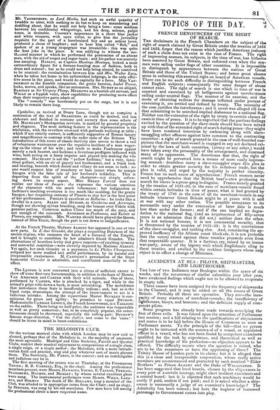et . td
4'
TOPICS OF THE DAY.
FRENCH DENOUNCERS OF THE RIGHT OF SEARCH.
THE declaimers in the French Chambers on the subject of the right of search claimed by Great Britain under the treaties of 1831 and 1833, forget that the reason which justifies American jealousy of such a claim does not exist in the case of France. The right of impressing seamen, its subjects, in the time of war, has hitherto been asserted by Great Britain, and enforced even when the sea- men were sailing under flags of other countries. It is impossible to distinguish by appearances between the natives of Great Britain and those of the United States ; and hence great abuses arose in enforcing this asserted right on board of American vessels. There can be no such difficulty in distinguishing between French and English subjects ; consequently the same danger of abuse cannot exist. The right of search is one which in time of war is asserted and exercised by all belligerents against merchantmen sailing under neutral flags. The manner of its exercise, and the mode of obtaining redress for damage inflicted under pretext of exercising it, are settled and defined by treaty. The necessity of the case justifies the interference ; and it never was alleged till now that submitting to be searched implied dishonour to a national flag. Neither can the extension of the right by treaty to certain classes of cases in time of peace. It is to be regretted that the partisan feelings excited by the question of the slave-trade should have been mixed up with that of the extended right of search during peace: they might have been rendered innoxious by embracing along with slave- smuggling other offences against laws common to the contracting countries : a right of search granted in the case of well-founded sus- picions that the merchant-vessel is engaged in any act declared cri- minal by the laws of both countries, (piracy or any other,) would have taken away the personality of the arrangement, and disarmed many of its opponents. The Americans fear that, the right of search might be perverted into a means of more easily impress- ing seamen : doubtless many a slave-smuggler urges this plea in order to obtain greater security for his nefarious trade, but the plea is valid, and urged by the majority in perfect sincerity. France has no such cause of apprehension : French seamen never need be apprehensive that the British boat's-crew professing to search for slaves is a press-gang in disguise. France merely granted by the treaties of 1831-33, in the case of merchant-vessels found within certain latitudes in time of peace, what it had granted by the treaty of 1786 in the case of all its merchant-vessels in any latitude whenever Great Britain might be at peace with it and at war with any other nation. The possible annoyance to its mercantile navy under the concession of later date is much less than under the former; and if the one implied no degra- dation to the national flag, (and an acquiescence of fifty-seven years is an admission that it did not,) neither does the other. It is not national honour, it is not commercial security, that is threatened by the treaties of 1831-33: it is the convenience of the slave-smuggler, and nothing else. And, considering the ap- proved inefficacy of the African coast blockade, it is not probable that the outcry raised against these treaties proceeds even from that respectable quarter. It is a factious cry, raised by an insane war-party, aware of the bigotry with which Englishmen cling to these treaties, and swelled by the reckless intriguers whose only object is to effect a change of Ministers.


























 Previous page
Previous page